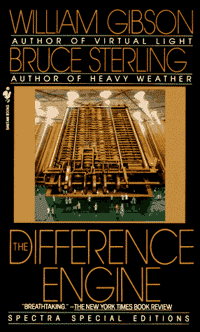In her last post Allana mentioned looking up the Ballester-Molina handgun, which led me back to the book looking for a reference to it. The Ballester-Molina was an Argentine handgun first produced in 1938, making it an odd anachronism for this book. (Unlike Allana, I am still wired, and am weakly dependent on Wikipedia and flagrant unsubstantiated rumor.)
Maybe it's odd to nitpick anachronisms in a book the very premise of which is the effects mechanical computing would have had on the Victorian Era had it been as widely adopted as electronic computing was in the 1990s. But in every other respect this book has been so meticulously researched that it would really bother me if this handgun, decades out of place, somehow worked it's way in.
A quick thumb through of the novel again tonight did not turn up a reference to this gun. Allana, did you find a mention of it in there? I see it is in the Difference Dictionary, so it must be in there somewhere.
At any rate, the thumb through led me to this post, which, although it first must contain an apology for being so long in coming, also contains a the first of a list of guns used by people in the novel, which will make everything better, as guns notoriously do.
Pepperbox - Mick Radley's little pocket gun, looted from his corpse by the mysterious Ranger who then used it to shoot Sam Houston in the early pages of the book:
This image of a 1837 pepperbox revolver comes from Jimmy Smith's photostream.
The pepperbox was widely available in Victorian England and commonly used for self defense. It was cheap to make, much less complex than a single barreled revolver. Mick's was delicately made enough that the Ranger breaks the trigger accidentally after three shots. It is first described when Sybil mistakenly pulls it our of Mick's coat pocket:
Her left hand gripped a lump of hard, cold metal. She drew out a nasty little pepperbox derringer. Ivory handle, intricate gleam of steel hammers and brass cartridges, small as her hand but heavy.
(The Difference Engine, Page 7)
Given that description, it probably looked something like this:
Instead of the wooden handle, imagine ivory, and imagine the rotating barrels to be brass, and you'll basically have it.
Howerver, given that Mick is a self conscious Dandy and a bit of a Victorian Gadget Geek, I like to imagine he carried this version instead:
Even in its less ridiculous straightforward model, it was not easy to aim, the hammer often obscuring a good sight down the barrel, and so was usually shot unaimed at close range. Although this gun existed in some form as far back as the 1400s, the version of it that Mick would have owned was designed in the 1830s and had a long, respectable life. In addition to being cheap, it was also a little safer than a single barreled revolver, in that should a discharge accidentally light the powder charges in the other barrels, all the slugs had their own barrels to exit from. In a single barreled revolver, the there could be an injurious backfire. In the pepperbox, you'd just end up blasting your target with all barrels at once.
The Ranger gets off three shots with Mick's pepperbox before breaking the delicate trigger in his beefy Texian hands. The first one is aimed, the book tells us, but at very close range as Houston is standing right in front of him. Houston doesn't try to dodge, but challenges the Ranger to shoot him directly in the chest, which he does. But what happens next is telling. The Ranger leaps on Houston and presses the rotating barrel directly against Houston's body, firing two more times with the gun actually pushed physically into Houston's chest. This would be the surest way of insuring that you hit your target with such an iffy gun.
I really appreciate it when writers research details like this well enough to describe their characters using period items in likely ways.
There are several more guns in the book, and now I'm interested to find out if they are all treated as faithfully!



